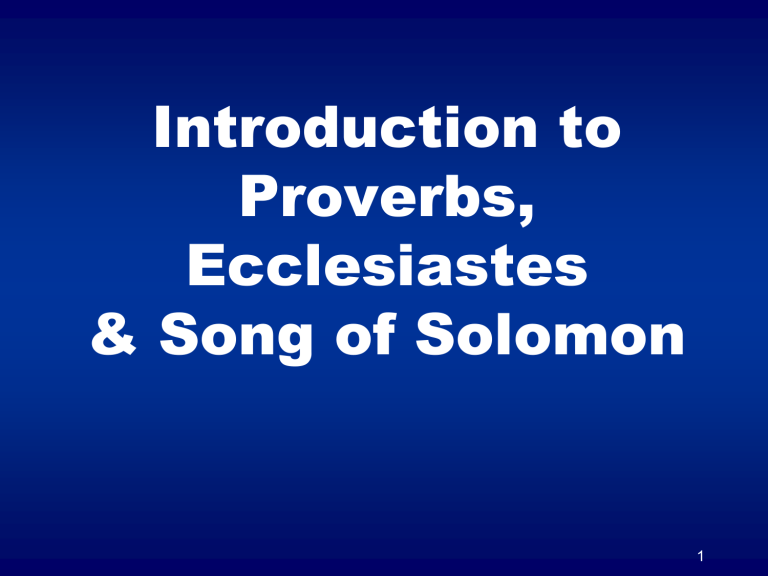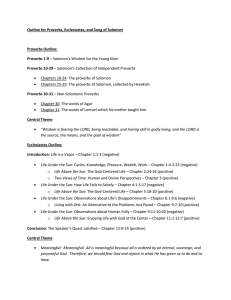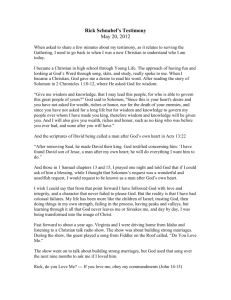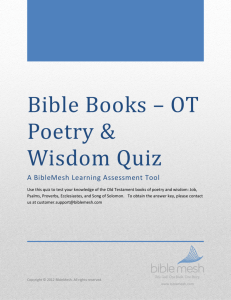
Introduction to Proverbs, Ecclesiastes & Song of Solomon 1 Solomon Son of David & Bathsheba Lived around 1000 BC Reigned 40 years, from about age 18-58 2 Proverbs 3 Proverbs Mashal in Hebrew – means “comparison, similar, parallel” Basic principles for living Teach wisdom (skillful living), especially in human relationships Truths without obligation (principles, not commands, of God) Easily memorized, but can take a lifetime to learn / implement 4 Proverbs Outline Words of Solomon 1:1 - 7 Purpose and theme 1:8 - 9:18 Exhortations to youth 10:1 - 29:27 Proverbs for all (some recorded by Solomon and some by godly men in Hezekiah’s time) Words of Agur (30:1:-33) Words of Lemuel (31:1-31) 5 Proverbs’ Purpose 1. Help the reader know wisdom and instruction (rather than foolishness and ignorance) – 1:2a 2. Help the reader perceive the words of understanding (rather than not understand) – 1:2b 3. Help the reader receive the instruction of wisdom, justice, judgment, and equity (rather than stubbornly keep acting like a child, not understanding justice, judgment and fairness) – 1:3 6 Proverbs’ Purpose 4. Help simple / immature people gain prudence (rather than saying and doing stupid things all the time) – 1:4a 5. Help young men gain knowledge and discretion (rather than waste their time, money and strength on meaningless, fun activities that benefit no one) – 1:4b 6. To help a wise man increase his ability to learn (so he can maximize his potential to help others) – 1:5a 7 Proverbs’ Purpose 7. To help a man of understanding gather wise counsel or accountability (rather than go through life learning lessons the hard way or perhaps falling into sin due to lack of anyone to warn or rebuke him) – 1:5b 8. To help the reader understand truths that are hidden from most people but reserved only for the wise (rather than being satisfied to know only the information spoon-fed by TV, radio and gossip) – 1:6 8 Skill & Discipline Wisdom (hokhmah) means “skill,” so it is something that takes time and practice Instruction (musar) means “discipline,” so it is something that requires sacrifice, focus, and hard work. Mentoring from someone older is also helpful. The ultimate goal is a righteous life – to help solve the problems around you instead of adding to the problems 9 Wisdom & Fearing God “The fear of the Lord is the beginning of knowledge, but fools despise wisdom and instruction.” – Pr. 1:7 NKJV Respect or reverence is on your terms and only requires agreement, not submission Fear is on God’s terms and requires obedient submission to His commands So a desire to obey God’s commands is a prerequisite to gaining spiritual knowledge Ignoring God’s commands (and those who teach God’s commands) means you retain your natural foolishness 10 Wisdom & Fearing God The object of fear is God’s judgment (Law of the Harvest) Do not be deceived. God is not mocked. A man reaps what he sows. – Gal. 6:7 So fearing God requires an expectation that temporal behavior will have eternal consequences Grace means that the prodigal son gets to sit at his father’s table The Law of the Harvest means that the prodigal son suffers loss and can’t get back the inheritance he squandered. 11 Fools Fools are not mentally retarded people Fools are are self-sufficient, ordering their lives as if there were no God, no Judgment and/or no Law of the Harvest In Proverbs and elsewhere in the Old Testament, a fool often denoted someone who was morally deficient, i.e., ethically and/or sexually immoral 12 Worldly Vs. Divine Wisdom Who is wise and understanding among you? Let him show by good conduct that his works are done in the meekness of wisdom. But if you have bitter envy and self-seeking in your hearts, do not boast and lie against the truth. This wisdom does not descend from above, but is earthly, sensual, demonic. For where envy and self-seeking exist, confusion and every evil thing are there. – James 3:13-16 NKJV 13 Worldly Vs. Divine Wisdom But the wisdom that is from above is first pure, then peaceable, gentle, willing to yield, full of mercy and good fruits, without partiality and without hypocrisy. Now the fruit of righteousness is sown in peace by those who make peace. – James 3:17,18 NKJV 14 Proverbs Summary—Proverbs are short sayings that communicate a moral truth or principle. The goal of the Book of Proverbs is to communicate wisdom for godly living, a wisdom that originates and comes from God. Wisdom is more precious than gold and only a fool is not interested in receiving its instructions. 15 16 Ecclesiastes Written by Solomon at the end of his life, looking back It expresses Solomon’s regret for his folly and wasted time due to carnality and idolatry “I had it all; I tried it all; it doesn’t satisfy; I sinned; don’t make my mistakes!” Basic principles for living 17 Ecclesiastes Written especially for young people who still have time to change their course in life Remember now your Creator in the days of your youth, before the difficult days come … when you lose your strength, lose your hearing, lose your good eyesight, lose your courage, lose your sexual desire … (Ecc. 12:1-5) 18 Ecclesiastes Outline Thesis: “All is Vanity” (1:1 - 11 ) Proof: “Life is Vain” (1:12-6:12) Counsel: “Fear God and keep His commandments” (7:1-12:14) 19 Ecclesiastes Truths We all must die; life is short All the work of man’s hand is vanity Man’s importance is not determined by success but by God’s declaration Significance is not found in achievement or accumulation of things but in serving people The words of God are intended to move us toward action 20 Ecclesiastes Summary—The Book of Ecclesiastes is attributed to Solomon and is a biography that examines the meaning of life. One of his conclusions is that all of men’s actions are essentially transitory and meaningless. Therefore one should enjoy life’s simple pleasures including work which is God’s gift to humans. The author’s final conclusion on life’s meaning however is the most noteworthy: Fear God and keep his commandment for that is the whole duty of everyone (Eccl 12:13). 21 22 Song of Solomon Historically It’s about the courtship and marriage of Solomon and a Shulamite shepherdess Practically It was used as a manual by young Hebrew newlyweds, to know how to properly feel about sexuality (something God gave them) Allegorically / Symbolically It’s about the courtship and marriage of Christ and His people (OT: Israel; NT: Church) 23 Song of Solomon Outline The beginning of love (1:1 - 5:1) Falling in love (1:1 - 3:5) Bride’s longing for affection Expressions of mutual love Visit of the king to the bride’s home Bride’s dream of separation United in love (3:6 - 5:1) Wedding procession Bride’s Beauty is praised The marriage is consummated 24 Song of Solomon Outline Broadening of love (5:2-8:14) Struggling in love (5:2 – 7:10) Bride’s second dream of separation Bridegroom’s handsomeness is praised Bride’s beauty is praised Growing in love (7:11 – 8:14) Bride’s desire to visit her home Journey and homecoming 25 Song of Solomon Aspects of the relationship Attraction Desire Companionship Pleasure Union Separation Faithfulness Praise 26 Song of Solomon Drama Written primarily from the point of view of the Shulamite Characters / Speakers: The bride (Shulamite) The beloved / groom (Solomon) The chorus (daughters of Jerusalem) 27 The Bride (Shulamite) A shepherdess Dark skin from working in the sun Perhaps woman # 141 of Solomon “There are sixty queens and eighty concubines” (S.S. 6:8) If most of Solomon’s wives and concubines were political arrangements, then perhaps this was his only pure romance up to that point 28 Song of Solomon Summary—A passionate love poem that presents the ideal love that should exist between a man and a woman in marriage. The song celebrates intimacy, sexual desire and the marital love of man to woman and woman to man. At the same time, the song serves as a metaphor for the covenant love that exists between God and his people. Indeed, marriage is the appropriate picture that describes our relationship with God. 29



